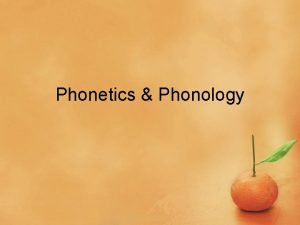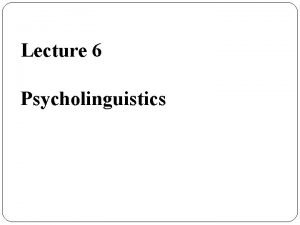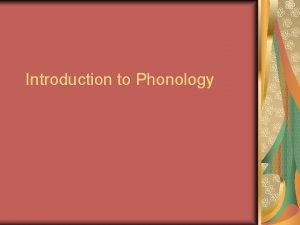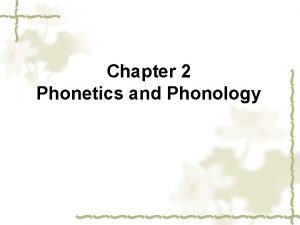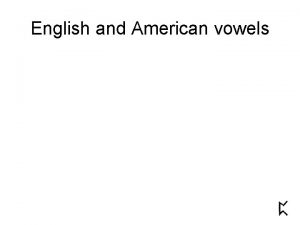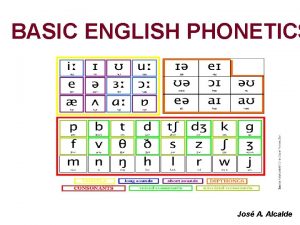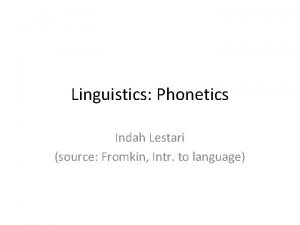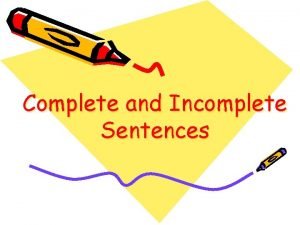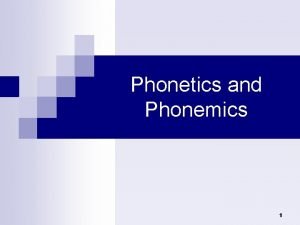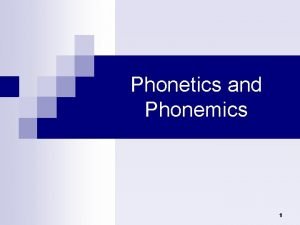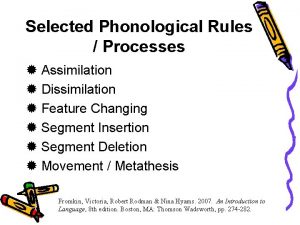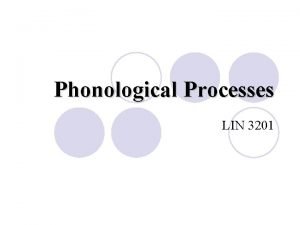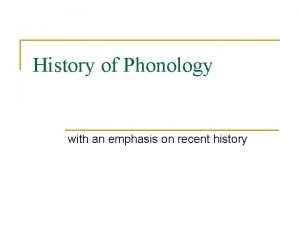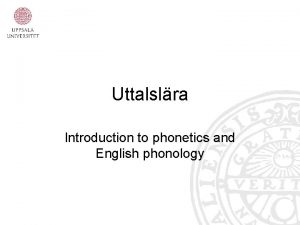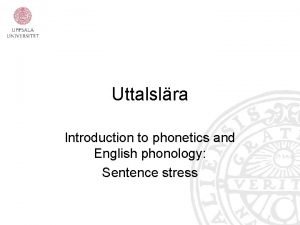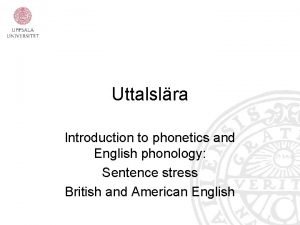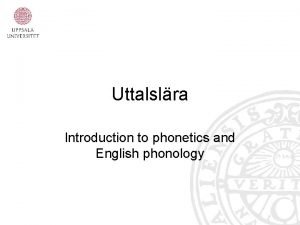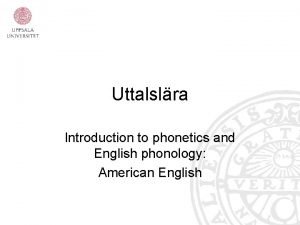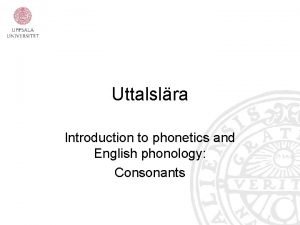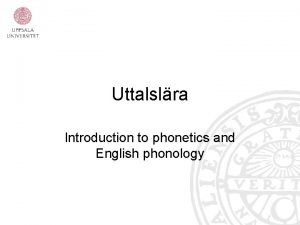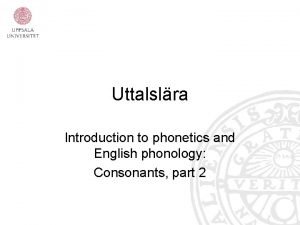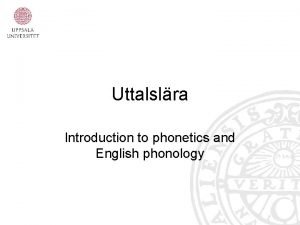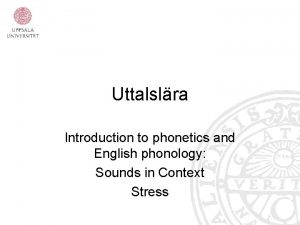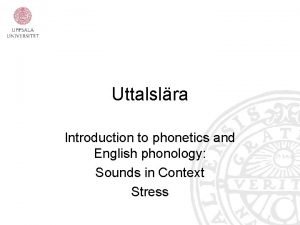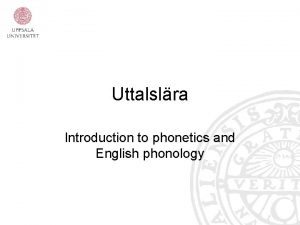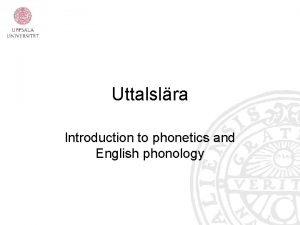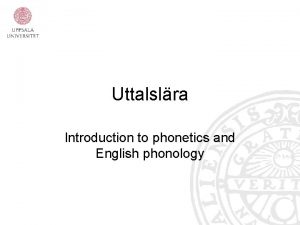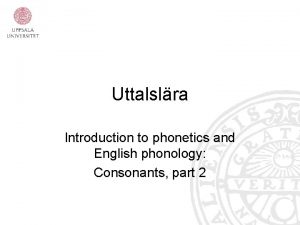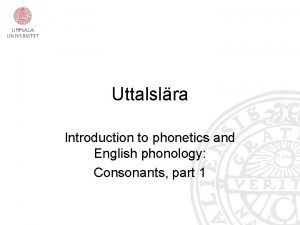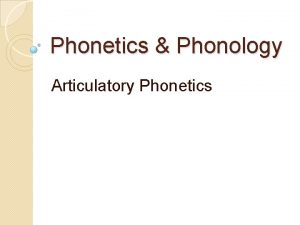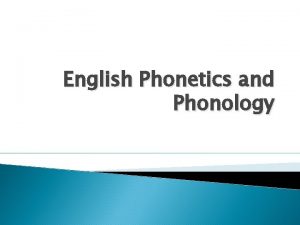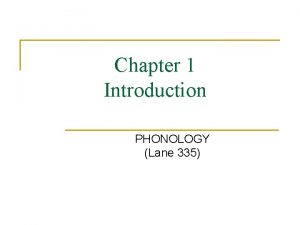Uttalslra Introduction to phonetics and English phonology Sentence




























- Slides: 28

Uttalslära Introduction to phonetics and English phonology: Sentence stress British and American English

What is stress? Stress (betoning) is when we use our voice to pronounce a syllable or a word with more emphasis. English has two types of stress: word stress and sentence stress.

Sentence stress is when one word in a sentence is pronounced with more force than the other words: Did he do that?

Which words are stressed? Rule of thumb: Content words (lexical words) are stressed. Function words are unstressed. In other words: Nouns, adjectives, adverbs, main verbs are stressed. Pronouns, auxiliary verbs, prepositions, conjunctions, articles are unstressed. (This is a general rule. )

Which words are stressed? When a content word doesn’t add new information, it can be unstressed. French is a difficult language. French verbs are particularly difficult.

Which words are stressed? When a function word adds new information, it can be stressed – e. g. for emphasis or contrast. It is a beautiful picture.

Stress timing Two types of languages: Syllable timed (e. g. Finnish, French, Spanish) and stress timed (e. g. Swedish, English). In a stress timed language, the perceived length of time between each stressed word is roughly equal.

Stress timing The beautiful mountain appeared transfixed in the distance. He can come on Sundays as long as he doesn't have to do any homework in the evening.

Stress timing The beautiful mountain appeared transfixed in the distance. He can come on Sundays as long as he doesn't have to do any homework in the evening.

Stress timing The beautiful mountain appeared transfixed in the distance. He can come on Sundays as long as he doesn't have to do any homework in the evening.

Stress timing ARRIVING BANFORD STATION SATURDAY NOON. PLEASE MEET. LOVE JANE I shall be arriving at Banford station on Saturday at noon. Please can you meet me? With love from Jane.

Sentence stress vs. strong and weak forms Many function words (e. g. some, and, could, the, him) have strong and weak forms. When the word is unstressed, the weak form is used. Note! All unstressed function words don’t have strong and weak forms.

Strong and weak forms In the weak form of the function word. . • the vowel is reduced • initial /h/ is reduced or removed • final consonant is reduced (especially in and)

Varieties of English: British and American English “England America are two countries separated by a common language. ” George Bernard Shaw

“American English” Has its roots in English as it was spoken in Britain, Scotland Ireland in the 18 th century. Pronunciation changes in North America as well as in Britain/Scotland/Ireland have resulted in the different pronunciations we hear today.

“General American” GA is an umbrella term used for “standard” US English. Canadian English have many phonological similarities with GA, but is considered a separate variety. There are comparatively few regional accents in US English.

Differences between RP and GA • Vocabulary (e. g. pavement - sidewalk) • Semantics (e. g. first floor) • Spelling (e. g. colour - color) • Pronunciation

Different vowel sounds RP /ʌ/ — GA /ɜ/ worry, courage, hurry RP /ɒ/ — GA /ɑ: / ; /ɔ: / holiday, want, bomb ; gone, coffee RP /ɑ: / — GA /æ/ dance, laugh, bath "Bother, father caught hot coffee in the car park. "

Different consonant sounds In GA, but not in RP • /r/ is pronounced in all positions • /l/ is more or less dark in all positions • /t/ is voiced or a tap in some positions • “wh” is often pronounced /hw/

Different word stress In some words, primary stress is earlier in GA than in RP RP GA mi • grate do • nate re • search

Different word stress In some French loanwords, primary stress is later in GA than in RP RP GA ga • rage ca • fé de • bris bal • let

Vowel reduction differences In some words with suffixes, the vowel in the suffix is less reduced in GA than in RP. Examples: melancholy cemetary category ceremony monastery

Different pronunciations Many words have other pronunciation differences. RP GA ate /et/ /eıt/ clerk /klɑ: k/ /klɜ: rk/ vase /vɑ: z/ /veıs/ shone /ʃɒn/ /ʃoʊn/ progress /'prəʊgres/ /'prɑ: grəs/

RP versus GA Text: “The North Wind and the Sun” http: //alt-usage-english. org/north_txt. html Listen especially for vowel differences, differences in the pronunciation of /r/, and the RP pronunciation of shone. GA RP

and now for something completely different. . .

Written exam, A 1, HS 1, Celtic studies • Part of the A 1/HS 1/T 1 language structure exam • 20 multiple choice questions (1 point each) • Roughly proportioned according to the time given to the subject areas in the lectures • Example exam in the lang structure compendium

Handouts • IPA chart, vowels • IPA chart, consonants • Study guide to Introducing

Thanks for listening!
 Introduction to general phonetics and phonology
Introduction to general phonetics and phonology Phonetic speech sounds
Phonetic speech sounds Differences between phonetics and phonology
Differences between phonetics and phonology Onset coda and nucleus
Onset coda and nucleus Phonetics and phonology
Phonetics and phonology A concise introduction to linguistics
A concise introduction to linguistics Working memory
Working memory Phonetics vs phonology
Phonetics vs phonology What is the difference between phonetics and phonology
What is the difference between phonetics and phonology Secondary vowels
Secondary vowels Phonetics and phonology
Phonetics and phonology Natural classes phonology
Natural classes phonology Phonetics vs phonology
Phonetics vs phonology Excrescense
Excrescense American english phonology
American english phonology Basic english phonetics
Basic english phonetics Branches of phonetics
Branches of phonetics Irrelevant examples
Irrelevant examples Complete vs incomplete sentences
Complete vs incomplete sentences Discourse analysis and phonology
Discourse analysis and phonology Peaking intonation examples
Peaking intonation examples Definition of consonants
Definition of consonants Phonetics n
Phonetics n Dissimilation definition
Dissimilation definition Contrastive distribution
Contrastive distribution Assimilation rules in phonology
Assimilation rules in phonology Non segmental phonology
Non segmental phonology Autosegmental phonology
Autosegmental phonology Manner features
Manner features




